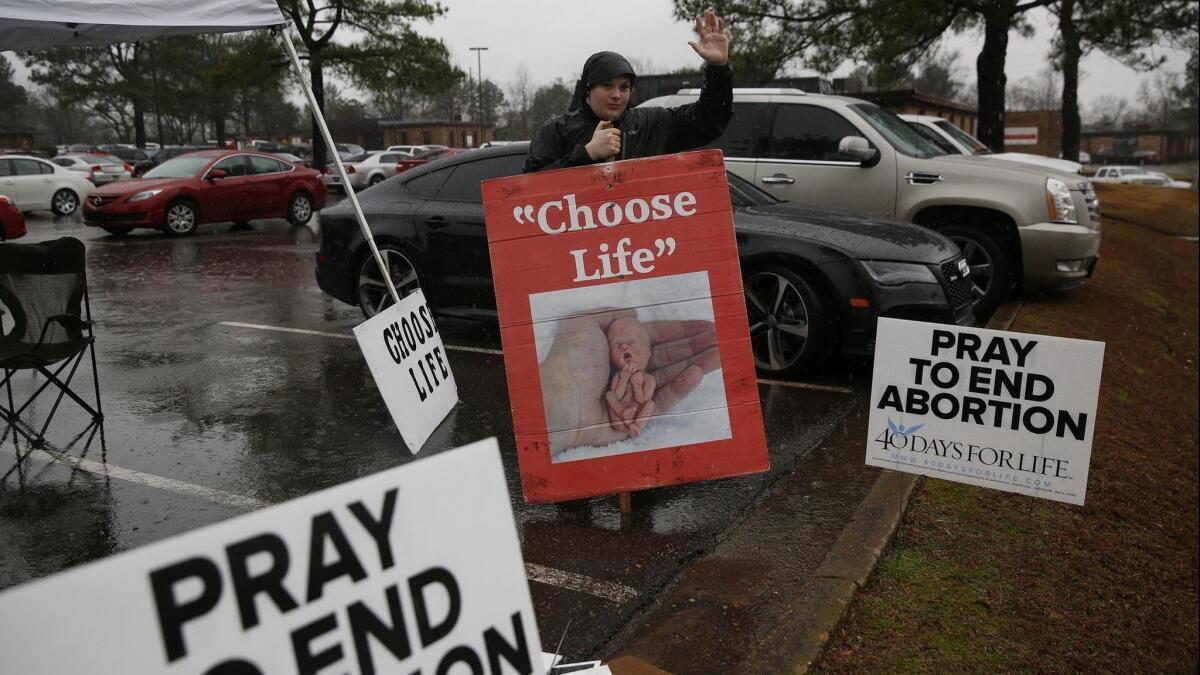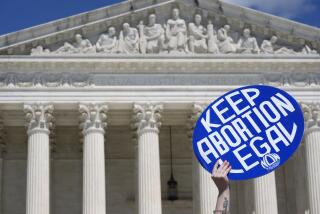Op-Ed: Alabama’s Amendment 2 provides a view of a post-Roe world

In Alabama on Tuesday, 59% of voters ratified Amendment 2, adding the State Abortion Policy Amendment to the state constitution. It would be easy to dismiss Amendment 2 as an empty political gambit aimed at increasing Republican voter turnout, but that would be a mistake. Instead, it represents clear and troubling evidence of what a post-Roe vs. Wade world would look like — and the U.S. Supreme Court should take note now.
On its own, Amendment 2 does not have much immediate legal effect. It makes it Alabama’s public policy “to ensure the protection of the rights of the unborn child” and “to recognize and support the sanctity of unborn life and the rights of unborn children, including the right to life.” Existing Alabama state law already says as much, but two U.S. Supreme Court rulings prevent the Legislature from completely banning abortion: Roe vs. Wade (establishing a woman’s constitutional right to maintain or terminate a pregnancy) and Planned Parenthood vs. Casey (stating that the government can’t place a substantial obstacle in the path of women seeking an abortion).
Amendment 2, however, has a potent political effect: It gives Alabama’s GOP-controlled Legislature an electoral and constitutional mandate to enact a “fetal personhood” statute. That is, to pass a law stating that life begins at conception — and to do so as soon as possible if and when the Supreme Court overturns Roe. A fetal personhood statute would create a veritable hornet’s nest of intractable legal issues revolving around two people sharing a common body (the woman’s).
Amendment 2 reveals that a world without Roe would be even more complicated, and jurisprudentially messy, than we would otherwise imagine it to be.
The politics of anti-abortion legislation are already irresistible to Republican legislators in many conservative states, not just Alabama, because they are wildly popular with base voters but also don’t tax state budgets. If Roe were overturned and abortion policy returned to the states under their traditional power to regulate public health, safety, welfare and morals, it is virtually certain that fetal personhood statutes would be adopted in many states.
If the conservative justices on the U.S. Supreme Court find enforcing Roe troublesome, they should consider carefully what lies ahead if they overturn it. Do they wish to start hearing cases involving injunctions that order pregnant women literally imprisoned during their pregnancies?
This is not merely the stuff of overactive legal imaginations or dystopian television programs. In some localities, prosecutors already have tried to use existing state laws to secure the involuntary confinement of pregnant women. Alabama, in fact, is one of a small number of jurisdictions that permit a prosecutor to bring drug charges against a woman in order to seek her imprisonment for the duration of her pregnancy.
Alabama law prohibits the “chemical endangerment” of a child. Since 2006, more than 500 women in Alabama have been charged with violating this law. In 2016, an Alabama state trial judge, David Hobdy, ordered Alexandra Laird, a pregnant 21-year-old woman suffering from heroin addiction, to be jailed while she was facing pending criminal charges under the child chemical endangerment statute. The judge revoked Laird’s bond and ordered her jailed for the balance of her pregnancy. “This court is very concerned about the welfare of the unborn child,” he explained.
Doctors refused to discharge Laird from the University of Alabama at Birmingham hospital where she was receiving treatment for her addiction. As a result, she was never actually jailed — but she remained in the involuntary custody of medical care professionals until she gave birth. Had Laird left the hospital, she would have been incarcerated under Hobdy’s order.
Even if Amendment 2 does not alter today’s legal landscape, it make plain how states are already positioning themselves to respond immediately if Roe is overturned. The liberty of women who find themselves pregnant could be significantly curtailed — if not denied completely — in the interest of protecting a gestating fetus. States that are particularly hostile to women’s reproductive rights will certainly enact and enforce laws that permit women to be imprisoned for nine months because they might pose a threat to their “unborn child.”
Enter the Fray: First takes on the news of the minute from L.A. Times Opinion »
If the U.S. Supreme Court wishes to avoid a politically charged engagement with abortion rights over the next decade — a fight that would further undermine its recently damaged institutional legitimacy — it should follow the wise course adopted by Justices Anthony Kennedy, Sandra Day O’Connor and David Souter, in their joint Casey opinion, and leave in place the existing constitutional balance between a state’s interest and women’s reproductive rights.
Amendment 2 reveals that a world without Roe would be even more complicated, and jurisprudentially messy, than we would otherwise imagine it to be.
Fetal personhood statutes, and their attempt to create legal recognition of two people inhabiting the same body, will enmesh the federal courts in questions they are in no better position to answer now than they were 45 years ago. As Justice Harry Blackmun sagely wrote in his 1973 Roe decision, “When those trained in the respective disciplines of medicine, philosophy, and theology are unable to arrive at any consensus, the judiciary, at this point in the development of man’s knowledge, is not in a position to speculate as to the answer.”
Ronald J. Krotoszynski Jr. is a law professor at the University of Alabama and author of “Reclaiming the Petition Clause.”
Follow the Opinion section on Twitter @latimesopinionand Facebook
More to Read
A cure for the common opinion
Get thought-provoking perspectives with our weekly newsletter.
You may occasionally receive promotional content from the Los Angeles Times.










